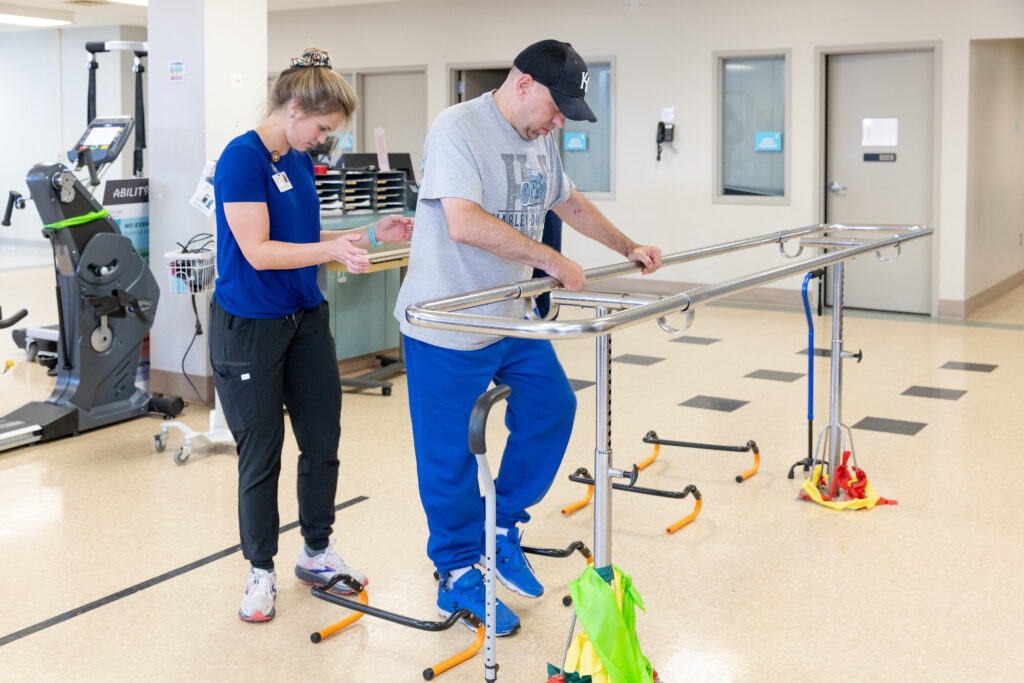
Older Americans are significantly more likely than younger adults to have an acquired disability. About 46% of Americans ages 75 and older and 24% of those between 65 and 74 report having a disability, according to estimates from the Census Bureau’s 2021 American Community Survey (ACS). This compares with 12% of adults ages 35-64 and 8% of adults under 35.
A new disability can affect every part of your life, and it will take a lot of adjustment. But rehabilitation can help you reach your highest potential for independence and maintain a high quality of life.
This article outlines 10 ways we help patients adjust to life with an acquired disability in outpatient medical rehab at Ability KC.
How can outpatient medical rehab help me adjust to my new disability?
A new disability will make an impact on your mental and emotional wellness in addition to your physical health. But recovering and adjusting isn’t something you should do alone. A comprehensive outpatient rehab program is your connection to a supportive community of peers and experts. You’ll receive medical care and education about your condition in addition to therapy. You’ll also give and receive support during group sessions. Peer support groups help many of our patients keep their spirits up during their toughest days in treatment.
A temporary or permanent disability can affect your routines at home and even your job. During rehab, we help our patients learn to adapt their diet and exercise regimens in ways they can manage long after they finish treatment. This includes meal planning, preparation and grocery shopping. You may not be able to do everything you used to do for yourself. Still, we can help you navigate changing roles in your family and your support system.
Outpatient medical rehab can help you recover and adjust to the following conditions:
- Stroke
- Serious injury
- Chronic illness
- Traumatic brain injury (TBI)
- Amputation
- Spinal cord injury
10 ways outpatient medical rehab helps people adjust to life with an acquired disability
Outpatient rehab combines care for your medical condition with all-around wellness support and human and social services. With help from an integrated team of experts and other patients going through similar transitions, you can minimize your disability’s impact on your life. It starts with the basics of physical therapy, occupational therapy and speech therapy. Once you’ve recovered skills needed for daily functioning, we can help you with more complex activities like driving and going to work.
Outpatient medical rehab can help you adjust to a new disability in the following ways:
- Relearn or adapt activities of daily living (ADLs) — Get comfortable caring for your basic needs and getting around at home.
- Improve mobility — Learn to walk again with the Ekso GT and other assistive devices.
- Mental health support — Mental health is the basis for all other types of wellness. We’ll provide support with your outlook on life and adjusting to your new disability.
- Social wellness support — Your relationships are an important part of recovery and continued well-being. We provide support for your personal relationships and your connections with a larger community.
- Assistance with home adaptations — You may need to make some changes at home for your mobility and safety. We can help you manage these decisions.
- Help with assistive technology — Prosthetics and mobility devices are just the beginning. We can help you find assistive tech devices to help with all kinds of skills and learn to use them.
- Help with diet adjustments and meal planning — You may have new dietary restrictions or some difficulties planning and preparing meals. We can help you adjust your routines.
- Help adapting your fitness regimen — People with all kinds of disabilities still need to maintain their physical fitness. We’ll help you recover your strength and find exercises you can do at home.
- Employment services — While you’re recovering, you may need to communicate with your employer, ask for accommodations or find a new position. We provide support with career transitions and learning to use assistive technology in the workplace.
- Driving evaluation and training — You may still be able to drive, with some special training and adjustments. We can help you make the transition.
Learn to live well with your acquired disability at Ability KC
Your life may not look the same with an acquired disability, but a comprehensive day rehab program can help you reach your full potential for a satisfying life. At Ability KC, we recognize that our patients are individuals with unique identities and complex lives. We want to set you up for continued well-being and success long after you’re done with our program.
How do you know you can trust Ability KC? We’re a designated Comprehensive Outpatient Rehabilitation Facility (CORF) with a Commission on Accreditation of Rehabilitation Facilities (CARF) accreditation. This means we surpass both national and international standards for rehab facilities.
Are you looking for an outpatient rehab program right now? Contact our team today for more information or to schedule an initial appointment.